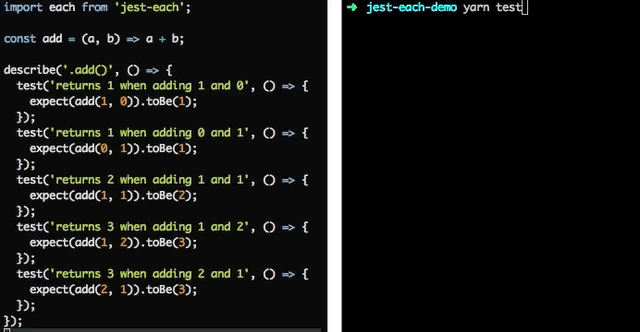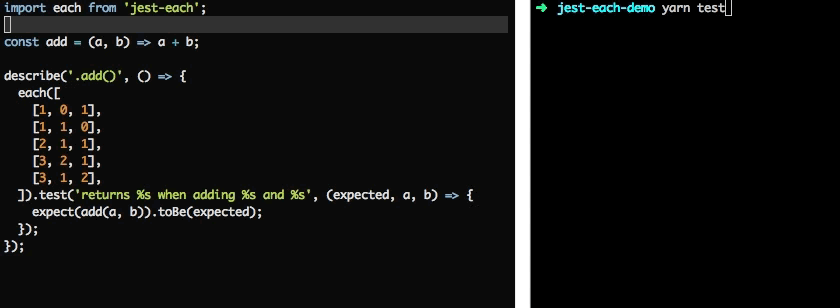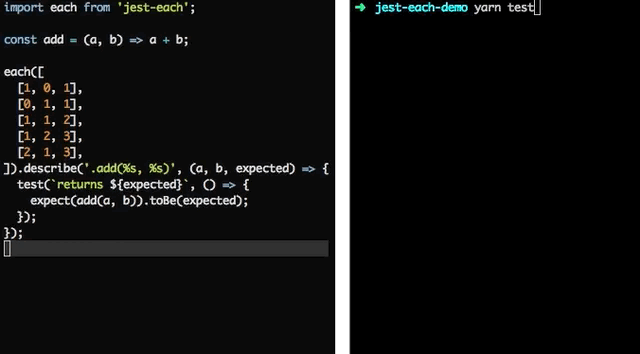A parameterised testing library for Jest inspired by mocha-each.
jest-each allows you to provide multiple arguments to your test/describe which results in the test/suite being run once per row of parameters.
-
.testto runs multiple tests with parameterised data- Also under the alias:
.it
- Also under the alias:
-
.test.onlyto only run the parameterised tests- Also under the aliases:
.it.onlyor.fit
- Also under the aliases:
-
.test.skipto skip the parameterised tests- Also under the aliases:
.it.skipor.xitor.xtest
- Also under the aliases:
-
.test.concurrent- Also under the alias:
.it.concurrent
- Also under the alias:
-
.test.concurrent.only- Also under the alias:
.it.concurrent.only
- Also under the alias:
-
.test.concurrent.skip- Also under the alias:
.it.concurrent.skip
- Also under the alias:
-
.describeto runs test suites with parameterised data -
.describe.onlyto only run the parameterised suite of tests- Also under the aliases:
.fdescribe
- Also under the aliases:
-
.describe.skipto skip the parameterised suite of tests- Also under the aliases:
.xdescribe
- Also under the aliases:
- Asynchronous tests with
done - Unique test titles with
printfformatting:-
%p- pretty-format. -
%s- String. -
%d- Number. -
%i- Integer. -
%f- Floating point value. -
%j- JSON. -
%o- Object. -
%#- Index of the test case. -
%$- Number of the test case. -
%%- single percent sign ('%'). This does not consume an argument.
-
- Unique test titles by injecting properties of test case object
- 🖖 Spock like data tables with Tagged Template Literals
.test
.test with Tagged Template Literals
.describe
npm i --save-dev jest-each
yarn add -D jest-each
jest-each is a default export so it can be imported with whatever name you like.
// es6
import each from 'jest-each';// es5
const each = require('jest-each').default;- parameters:
Arrayof Arrays with the arguments that are passed into thetestFnfor each row-
Note If you pass in a 1D array of primitives, internally it will be mapped to a table i.e.
[1, 2, 3] -> [[1], [2], [3]]
-
Note If you pass in a 1D array of primitives, internally it will be mapped to a table i.e.
- name:
Stringthe title of thetest.- Generate unique test titles by positionally injecting parameters with
printfformatting:-
%p- pretty-format. -
%s- String. -
%d- Number. -
%i- Integer. -
%f- Floating point value. -
%j- JSON. -
%o- Object. -
%#- Index of the test case. -
%$- Number of the test case. -
%%- single percent sign ('%'). This does not consume an argument.
-
- Or generate unique test titles by injecting properties of test case object with
$variable- To inject nested object values use you can supply a keyPath i.e.
$variable.path.to.value(only works for "own" properties, e.g.$variable.constructor.namewouldn't work) - You can use
$#to inject the index of the test case - You cannot use
$variablewith theprintfformatting except for%%
- To inject nested object values use you can supply a keyPath i.e.
- Generate unique test titles by positionally injecting parameters with
- testFn:
Functionthe test logic, this is the function that will receive the parameters of each row as function arguments
- parameters:
Arrayof Arrays with the arguments that are passed into thesuiteFnfor each row-
Note If you pass in a 1D array of primitives, internally it will be mapped to a table i.e.
[1, 2, 3] -> [[1], [2], [3]]
-
Note If you pass in a 1D array of primitives, internally it will be mapped to a table i.e.
- name:
Stringthe title of thedescribe- Generate unique test titles by positionally injecting parameters with
printfformatting:-
%p- pretty-format. -
%s- String. -
%d- Number. -
%i- Integer. -
%f- Floating point value. -
%j- JSON. -
%o- Object. -
%#- Index of the test case. -
%$- Number of the test case. -
%%- single percent sign ('%'). This does not consume an argument.
-
- Or generate unique test titles by injecting properties of test case object with
$variable- To inject nested object values use you can supply a keyPath i.e.
$variable.path.to.value(only works for "own" properties, e.g.$variable.constructor.namewouldn't work) - You can use
$#to inject the index of the test case - You cannot use
$variablewith theprintfformatting except for%%
- To inject nested object values use you can supply a keyPath i.e.
- Generate unique test titles by positionally injecting parameters with
- suiteFn:
Functionthe suite oftest/its to be ran, this is the function that will receive the parameters in each row as function arguments
Alias: .it(name, fn)
each([
[1, 1, 2],
[1, 2, 3],
[2, 1, 3],
]).test('returns the result of adding %d to %d', (a, b, expected) => {
expect(a + b).toBe(expected);
});each([
{a: 1, b: 1, expected: 2},
{a: 1, b: 2, expected: 3},
{a: 2, b: 1, expected: 3},
]).test('returns the result of adding $a to $b', ({a, b, expected}) => {
expect(a + b).toBe(expected);
});Aliases: .it.only(name, fn) or .fit(name, fn)
each([
[1, 1, 2],
[1, 2, 3],
[2, 1, 3],
]).test.only('returns the result of adding %d to %d', (a, b, expected) => {
expect(a + b).toBe(expected);
});Aliases: .it.skip(name, fn) or .xit(name, fn) or .xtest(name, fn)
each([
[1, 1, 2],
[1, 2, 3],
[2, 1, 3],
]).test.skip('returns the result of adding %d to %d', (a, b, expected) => {
expect(a + b).toBe(expected);
});Aliases: .it.concurrent(name, fn)
each([
[1, 1, 2],
[1, 2, 3],
[2, 1, 3],
]).test.concurrent(
'returns the result of adding %d to %d',
(a, b, expected) => {
expect(a + b).toBe(expected);
},
);Aliases: .it.concurrent.only(name, fn)
each([
[1, 1, 2],
[1, 2, 3],
[2, 1, 3],
]).test.concurrent.only(
'returns the result of adding %d to %d',
(a, b, expected) => {
expect(a + b).toBe(expected);
},
);Aliases: .it.concurrent.skip(name, fn)
each([
[1, 1, 2],
[1, 2, 3],
[2, 1, 3],
]).test.concurrent.skip(
'returns the result of adding %d to %d',
(a, b, expected) => {
expect(a + b).toBe(expected);
},
);Alias: .it(name, fn(done))
each([['hello'], ['mr'], ['spy']]).test(
'gives 007 secret message: %s',
(str, done) => {
const asynchronousSpy = message => {
expect(message).toBe(str);
done();
};
callSomeAsynchronousFunction(asynchronousSpy)(str);
},
);each([
[1, 1, 2],
[1, 2, 3],
[2, 1, 3],
]).describe('.add(%d, %d)', (a, b, expected) => {
test(`returns ${expected}`, () => {
expect(a + b).toBe(expected);
});
test('does not mutate first arg', () => {
a + b;
expect(a).toBe(a);
});
test('does not mutate second arg', () => {
a + b;
expect(b).toBe(b);
});
});each([
{a: 1, b: 1, expected: 2},
{a: 1, b: 2, expected: 3},
{a: 2, b: 1, expected: 3},
]).describe('.add($a, $b)', ({a, b, expected}) => {
test(`returns ${expected}`, () => {
expect(a + b).toBe(expected);
});
test('does not mutate first arg', () => {
a + b;
expect(a).toBe(a);
});
test('does not mutate second arg', () => {
a + b;
expect(b).toBe(b);
});
});Aliases: .fdescribe(name, fn)
each([
[1, 1, 2],
[1, 2, 3],
[2, 1, 3],
]).describe.only('.add(%d, %d)', (a, b, expected) => {
test(`returns ${expected}`, () => {
expect(a + b).toBe(expected);
});
});Aliases: .xdescribe(name, fn)
each([
[1, 1, 2],
[1, 2, 3],
[2, 1, 3],
]).describe.skip('.add(%d, %d)', (a, b, expected) => {
test(`returns ${expected}`, () => {
expect(a + b).toBe(expected);
});
});each`
a | b | expected
${1} | ${1} | ${2}
${1} | ${2} | ${3}
${2} | ${1} | ${3}
`.test('returns $expected when adding $a to $b', ({a, b, expected}) => {
expect(a + b).toBe(expected);
});- First row of variable name column headings separated with
| - One or more subsequent rows of data supplied as template literal expressions using
${value}syntax.
- name:
Stringthe title of thetest, use$variablein the name string to inject test values into the test title from the tagged template expressions- To inject nested object values use you can supply a keyPath i.e.
$variable.path.to.value(only works for "own" properties, e.g.$variable.constructor.namewouldn't work) - You can use
$#to inject the index of the table row.
- To inject nested object values use you can supply a keyPath i.e.
- testFn:
Functionthe test logic, this is the function that will receive the parameters of each row as function arguments
each`
a | b | expected
${1} | ${1} | ${2}
${1} | ${2} | ${3}
${2} | ${1} | ${3}
`.describe('$a + $b', ({a, b, expected}) => {
test(`returns ${expected}`, () => {
expect(a + b).toBe(expected);
});
test('does not mutate first arg', () => {
a + b;
expect(a).toBe(a);
});
test('does not mutate second arg', () => {
a + b;
expect(b).toBe(b);
});
});- First row of variable name column headings separated with
| - One or more subsequent rows of data supplied as template literal expressions using
${value}syntax.
- name:
Stringthe title of thetest, use$variablein the name string to inject test values into the test title from the tagged template expressions- To inject nested object values use you can supply a keyPath i.e.
$variable.path.to.value(only works for "own" properties, e.g.$variable.constructor.namewouldn't work)
- To inject nested object values use you can supply a keyPath i.e.
- suiteFn:
Functionthe suite oftest/its to be ran, this is the function that will receive the parameters in each row as function arguments
Alias: .it(name, fn)
each`
a | b | expected
${1} | ${1} | ${2}
${1} | ${2} | ${3}
${2} | ${1} | ${3}
`.test('returns $expected when adding $a to $b', ({a, b, expected}) => {
expect(a + b).toBe(expected);
});Aliases: .it.only(name, fn) or .fit(name, fn)
each`
a | b | expected
${1} | ${1} | ${2}
${1} | ${2} | ${3}
${2} | ${1} | ${3}
`.test.only('returns $expected when adding $a to $b', ({a, b, expected}) => {
expect(a + b).toBe(expected);
});Aliases: .it.skip(name, fn) or .xit(name, fn) or .xtest(name, fn)
each`
a | b | expected
${1} | ${1} | ${2}
${1} | ${2} | ${3}
${2} | ${1} | ${3}
`.test.skip('returns $expected when adding $a to $b', ({a, b, expected}) => {
expect(a + b).toBe(expected);
});Alias: .it(name, fn(done))
each`
str
${'hello'}
${'mr'}
${'spy'}
`.test('gives 007 secret message: $str', ({str}, done) => {
const asynchronousSpy = message => {
expect(message).toBe(str);
done();
};
callSomeAsynchronousFunction(asynchronousSpy)(str);
});each`
a | b | expected
${1} | ${1} | ${2}
${1} | ${2} | ${3}
${2} | ${1} | ${3}
`.describe('$a + $b', ({a, b, expected}) => {
test(`returns ${expected}`, () => {
expect(a + b).toBe(expected);
});
test('does not mutate first arg', () => {
a + b;
expect(a).toBe(a);
});
test('does not mutate second arg', () => {
a + b;
expect(b).toBe(b);
});
});Aliases: .fdescribe(name, fn)
each`
a | b | expected
${1} | ${1} | ${2}
${1} | ${2} | ${3}
${2} | ${1} | ${3}
`.describe.only('$a + $b', ({a, b, expected}) => {
test(`returns ${expected}`, () => {
expect(a + b).toBe(expected);
});
});Aliases: .xdescribe(name, fn)
each`
a | b | expected
${1} | ${1} | ${2}
${1} | ${2} | ${3}
${2} | ${1} | ${3}
`.describe.skip('$a + $b', ({a, b, expected}) => {
test(`returns ${expected}`, () => {
expect(a + b).toBe(expected);
});
});MIT







